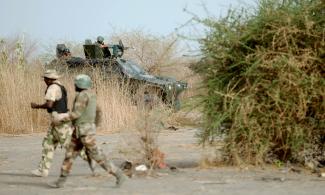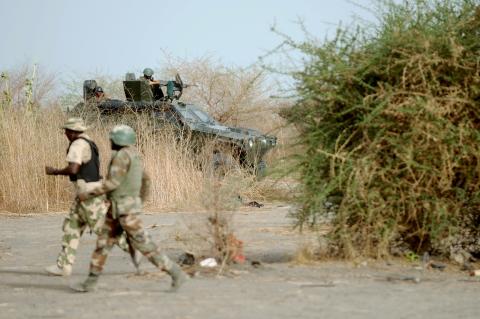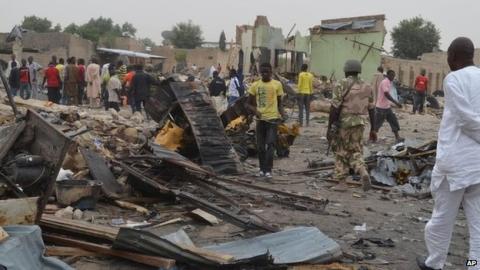
The first steps towards solving a problem fully is to understand the roots of the problem itself so that it can be weeded out entirely without any chance for it to keep growing back. For too long the Nigerian government led by President Goodluck Jonathan have led themselves and the general public into believing that the main reason Boko Haram has not been defeated yet is because of continued support for the Islamic Terrorists from some politicians and clergy in the north-east of the country.
The first steps towards solving a problem fully is to understand the roots of the problem itself so that it can be weeded out entirely without any chance for it to keep growing back. For too long the Nigerian government led by President Goodluck Jonathan have led themselves and the general public into believing that the main reason Boko Haram has not been defeated yet is because of continued support for the Islamic Terrorists from some politicians and clergy in the north-east of the country.


As much as that is a possibility considering that the chaotic nation we run makes it possible for politicians in the country (both North and South without exemption) to basically strike deals with anyone, including criminals as long as it helps their political interest, but the home truth is that Boko Haram is or has become an Al-Qaeda franchise and that is the root of the problem we need to deal with.
His indifference to the issue has made him see it more as an insurgency from the North against his administration to make the country ungovernable for him, rather than an urgent national problem to be tackled head on. It has led to people capitalising on it and forming their own versions of a political Boko Haram so as to justify the need for more money to be allocated as security votes or for defence purposes which evidently get looted and not used for its original intentions.
This has led to more carnage from both the Al-Qaeda inspired Boko Haram and its political versions. The end result is a needless loss of human lives through killings, bombings and kidnapping, as well as displacement of innocent people from their homes, farmlands and business places.
Between 2011 -2014, most especially in 2012 when President Jonathan just had about a year in office, names like John Alaku Akpavan, Lydia Joseph, Augustine Effiong, Emmanuel King, Alex Danladi, Jonathan Gyanet were reported by the Nigerian media as either having been caught by security agencies for attempting to bomb places or for having actually bombed churches across the country. Akpavan was arrested by the DSS for attempting to bomb the Radio House in Abuja, the rest either attempted to bomb churches in Bauchi, Bayelsa, Gombe, Nassarawa or actually succeeded in bombing the Bayero University Kano and the COCIN Church in Jos.
These are not the everyday names you would associate with Islamic terrorists, but rather shows a pattern of someone, somewhere trying to profit from insecurity and chaos across the nation so as to justify increased spending on security votes, or some group of people who want to use it as blackmail against northern politicians so as to win public sympathy for Jonathan’s presidency and accuse them of making the country ungovernable for him.
The result is that while we carried on with our political games, Boko Haram entrenched itself and are now in control of Nigerian territories declaring an Islamic Caliphate, abducting teenage girls as sex slaves with the help of foreign fighters, leaving Shekau and his bandits laughing their heads off President Jonathan for thinking its a northern insurgency, and at northern politicians for believing Boko Haram is an ally fighting for the north to come back into power.
In February 2003, the late Al-Qaeda leader Osama Bin Laden in one of his statements in 2002 urged Nigerian Muslims to bear arms against the Nigerian state, also in an audiotape released to Al-Jazeera in February 2013, he identified Nigeria as an important future arena for Al-Qaeda. To put it simply Boko Haram led by Abubakar Shekau if they were not an Al-Qaeda franchise when they started out in 2003, they are certainly one now in 2014. Its thus based on all these background that it behoves on the Nigerian Army, Air-force and homeland security agencies to refocus themselves adequately and face these urgent threat to national security that we have left too long to fester.
I’m certain the Nigerian Army can still defeat the Boko Haram threat, and I’m not going by whatever past glory people ascribe to our military, but based on the fact that as of now judging by the recent videos the terrorists release they are still a rag-tag bunch of bandits despite all the foreign fighters they have in their midst. It would be better we deal with them full on now and secure our homeland, while Al-Qaeda is still busy in Syria, Iraq and other multiple fronts. When such places settle, they would have more experienced and deadly foreign fighters to send to Nigeria, or if our political and economic situation deteriorates in 2015, they would have more fertile minds in the north to radicalise and recruit which would make it an intractable problem to solve. There is the possibility of a forever war on our hands if we don’t act now.
To refocus the army and deal with Boko Haram issue quickly from my research into the problem, there are some major things the army needs to sort out quickly amongst many others and they include the issue of poor training and indoctrination, weak leadership and commanders, tactical coordination (combined arms operations), hard-nosed human intelligence, understanding the terrain of the battle and adequate knowledge of the culture of the enemy and their attitude to time-keeping
I start with the weak leadership and commander issue, the politicised nature of our military means that political factors weigh heavily and frequently overrides military considerations thereby reducing professionalism in the military and this affects officers at the front-line who see their top bosses as not doing enough to help them defeat this terrorist scourge. Some weeks back the Chief of Defence staff (CDS) Air Marshal Alex Badeh was making a case for why the military can’t just drop $15,000 made bombs on one or two terrorists, such statements amongst many others demoralise fighting soldiers on the front-line who don’t see the full commitment of their superior bosses to this fight despite the huge amounts of monies we budget for security yearly.
When they call for aerial reinforcements to engage terrorists and it arrives late or not all, they wonder if it’s because the CDS doesn’t want to waste money dropping bombs. When you are fighting a serious and dangerous enemy as Boko Haram, $15,000 bomb should be no problem for you to preserve the lives of your soldiers and the civilians they threaten. Add to it the issue of corruption, top down decisions made from Abuja with no input from officers on the ground leading to highly centralised system affects the soldiers fighting to defend us and should be addressed. In terms of poor commanders, there is an old military truism that says: “There are no bad troops, just bad officers”. The rate of mutinies by soldiers across the northeast, shows there is an officer versus soldier culture that has crept into the army.
To be candid, there is always a social and professional gap between officers and enlisted men (what we call rank and file in Nigeria) in all armies in the world, but what the United States and other Western countries do to bridge that gap is to use the non-commissioned officer corps brigades (NCOs). I know for sure we had such brigades in the past and it served us so well during the Nigerian Civil war. A professional NCO corps are critical to training programmes in armies of developed countries, its effectiveness, and esprit de corps with enlisted men.
NCOs are former enlisted men who having distinguished themselves in battle and shown leadership skills are promoted from the rank and file, trained to become full officers. They can then pass on such trainings to their colleagues from whose rank they came out from, advocate for their needs when they meet with their fellow officers considering they were once enlisted men and know where the shoe pinches, as well as command them properly and get their loyalty (esprit de corps) when leading them to battle as they know he is one of their own and don’t want him to fail. In any case he serves as an example to other enlisted men as to the height they can get to if they distinguish themselves fully in serving the army and their nation.
But when you bring a commander fresh from defence academy (NDA) or who is a commissioned officer to lead enlisted men in tempest battles like the ones we fighting now, they have to be extremely good to get the full cooperation of the men they are leading otherwise you get dissent or sabotage like the ones we have at present. Its even worse when such commissioned officer despite the already existing social and professional gap between them starts stealing their salaries and allowances, give conflicting and unsure commands or clearly doesn’t know what he is doing.
If we have abolished the NCO brigade corps we need to return to it at this critical moment, and we also need to start promoting more enlisted men that have clearly distinguished themselves in these battle against Boko Haram or in foreign peacekeeping missions, it would help reduce many cases of mutinies and soldiers fleeing battle-fronts with their commanders. Studies have show that without the cohesion supplied by NCOs, units tend to disintegrate or fail in the stress of combat, as due to the highlighted problem above of the gap between enlisted men and officers, rank and file soldiers normally don’t trust their officers especially bad ones.
Poor training and indoctrination is also another problem at the moment. When soldiers on the front-line against Boko Haram keep reading in the papers, on internet sites in the media, or from stories from their wives and families that Boko Haram is a northern insurgency against Jonathan’s administration as the presidency keeps pushing out for political expediency it affects the indoctrination of our soldiers to fight.
They wonder why they should sacrifice their lives for Nigeria just because some bunch of politicians either want to get re-elected or have their way into power. Their indoctrination needs to start changing right away from the messages the presidency puts out, the opposition says, and defence chiefs in Abuja sends out. Our soldiers need to be told they are fighting a foreign terrorist organisation allied with Al-Qaeda and the present ideologies of ISIL.
Their commanders on the front-line need to keep instilling it in them regularly that they are fulfilling their signed up mission in full by engaging Boko Haram and they are not just doing it to help the political fortunes of President Jonathan or any other politician for that matter. Their duty is to protect the territorial integrity and sovereignty of Nigeria, and that is what they are doing each time they deal a deadly blow on Boko Haram, it would go a long way in committing them to fight.
In terms of poor training, I see some form of arrogance and ignorance on the part of some of our top military officers, who treat our soldiers as sub-humans or like they are non-Nigerians fighting for them. There is the truism in military life that an army fights as it trains. Many of the soldiers we send to face Boko Haram in the northeast have lived through years of peacetime and just like any other human being they do what ordinary civilians like us do. They get married and have kids, attend family functions, watch the Premier League on satellite TV shouting when their favourite team scores etc. when war then breaks out and you then expect them to suddenly turn into warriors without training you did be deceiving yourself.
Many of them have not been trained in heavy fighting, use of heavy weaponry or defending against it, fighting in enclosed spaces with little room to manoeuvre as well as in urban street fighting, thus its no surprise when the heat gets tough you see our soldiers fleeing and abandoning an entire division for Islamic insurgents to loot weapons. The truth is troops are always conditioned by peacetime habits, policies and procedures and they do not transform from “civilians” in uniforms into warriors overnight. General George Patton (a US army General during the second world war) used to tell his troops the story of Julius Caesar who “In the winter time (peacetime), so trained his legions of soldiers in all their duties and ingrained habits towards the performance of their duties as soldiers that in the spring of 52 BC when he went in search of a profitable war and committed his troops against the Gauls, it was not necessary to give them orders, for they knew what to do and how to do it”. That is the power of training as an army fights as it’s trained.
Boko Haram might be a new phenomenon for the army, but by now it should have learnt a lot of lessons from it and plan appropriate trainings for the soldiers fighting the war. Normally the soldiers we deploy to the northeast should be serving a six-month duty rotation so as to beat combat fatigue and stress, let’s say for the sake of expediency and shortage of manpower we can increase that to a nine-month duty rota. Whilst, the ones on tour duty are battling the terrorists, the new set of troops to be deployed should start training in their respective battalions while they await deployment. Experiences gathered from the soldiers at the front-line is documented, analysed and put into strategies, which the awaiting troops to be deployed start training on. Once a set of troops complete their nine-month duty tour, the next set of troops who are already trained adequately to all the likely and even unlikely challenges they may face in the northeast are then deployed.
There is no point deploying soldiers from a battalion in Lagos and Enugu without training or knowledge of the terrain and expect them to hold their ground in the face of heavy close fighting and use of heavy weapons by terrorists and when they flee you call them cowards. Its either the defence HQ officer who says that is ignorant or just plain archaic. I also suggest we call for more help, we would need at least up to 700-800 US military advisers and about half that amount of British and other allied partners military advisers to help us train our troops in close combat, heavy fighting, urban street warfare, use of heavy weapons and maintenance, as well as indoctrination as we are fighting Al-Qaeda an army of Nigeria and all of these nations mentioned.
This article will be concluded in a near future installment.
Ola’ Idowu is a management consultant and researcher writing in from the UK. Email: [email protected]